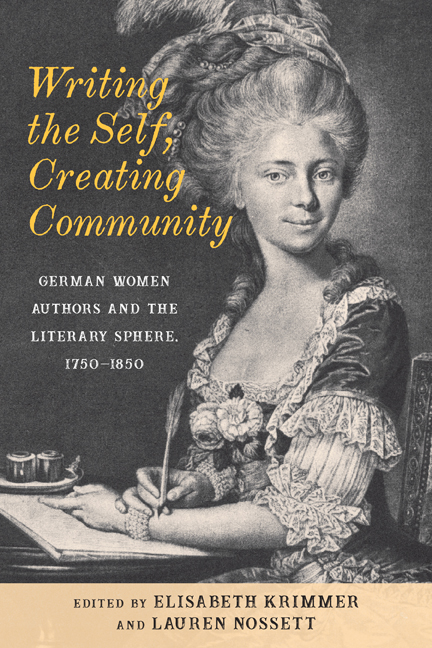Book contents
- Frontmatter
- Contents
- Acknowledgments
- Introduction
- Part I Writing a Community
- 1 Empowering Germany’s Daughters: On the Pedagogical Program and the Poetic Techniques of Sophie von La Roche
- 2 “Ich spreche lieber von guten Büchern”: Sophie von La Roche’s Concept of Female Authorship and Readership
- 3 Challenging Female Ideals: Marie-Elisabeth de La Fite’s Translation of Sophie von La Roche’s Geschichte des Fräuleins von Sternheim
- 4 Catherine II, Polyxene Büsching, and Johanna Charlotte Unzer: A Literary “Community of Practice”
- Part II Writing the Self
- 5 Ghostwriters: The Apparitional Author in Benedikte Naubert’s “Die Weiße Frau” (1792) and Sophie Albrecht’s Das Höfliche Gespenst (1797)
- 6 Vampirism Inverted: Pathology, Gender, and Authorship in Karoline von Günderrode’s “Die Bande der Liebe”
- 7 Wozu eine Amazonen—Literatur? Literary Creativity and Productivity in the Writings of Helmina von Chézy
- 8 Women Writers and the Märchenoma: Foremother, Identity, and Legacy
- Part III Writing toward Emancipation
- 9 The Illegitimacy of Authorship and the Legitimization of Passion in Agnes von Lilien
- 10 The Politics of the Female Body in Louise Aston’s and Fanny Lewald’s Writings through the Prism of the Romantic Theory of Sociability and Dialogue
- 11 Weibliche Irrsterne: Louise Otto and the Notion of Female Genius in Nineteenth-Century Germany
- Bibliography
- Notes on the Contributors
- Index
7 - Wozu eine Amazonen—Literatur? Literary Creativity and Productivity in the Writings of Helmina von Chézy
Published online by Cambridge University Press: 01 October 2020
- Frontmatter
- Contents
- Acknowledgments
- Introduction
- Part I Writing a Community
- 1 Empowering Germany’s Daughters: On the Pedagogical Program and the Poetic Techniques of Sophie von La Roche
- 2 “Ich spreche lieber von guten Büchern”: Sophie von La Roche’s Concept of Female Authorship and Readership
- 3 Challenging Female Ideals: Marie-Elisabeth de La Fite’s Translation of Sophie von La Roche’s Geschichte des Fräuleins von Sternheim
- 4 Catherine II, Polyxene Büsching, and Johanna Charlotte Unzer: A Literary “Community of Practice”
- Part II Writing the Self
- 5 Ghostwriters: The Apparitional Author in Benedikte Naubert’s “Die Weiße Frau” (1792) and Sophie Albrecht’s Das Höfliche Gespenst (1797)
- 6 Vampirism Inverted: Pathology, Gender, and Authorship in Karoline von Günderrode’s “Die Bande der Liebe”
- 7 Wozu eine Amazonen—Literatur? Literary Creativity and Productivity in the Writings of Helmina von Chézy
- 8 Women Writers and the Märchenoma: Foremother, Identity, and Legacy
- Part III Writing toward Emancipation
- 9 The Illegitimacy of Authorship and the Legitimization of Passion in Agnes von Lilien
- 10 The Politics of the Female Body in Louise Aston’s and Fanny Lewald’s Writings through the Prism of the Romantic Theory of Sociability and Dialogue
- 11 Weibliche Irrsterne: Louise Otto and the Notion of Female Genius in Nineteenth-Century Germany
- Bibliography
- Notes on the Contributors
- Index
Summary
Kein Cherub war es, der das wehrlose Kind aus ihrem Paradies vertrieb; es war das verjährte Vorurtheil, das feindlich den Frauen gegen geistigen Aufschwung entgegenwirkte. In der Wüste des Lebens sollte das Weib nur Kamel und Dromedar sein, das ging solange es seine eigendste Bestimmung nicht kannte”
[No cherub drove the defenseless child from her paradise; it was out-of-date prejudice that thwarted with hostility the intellectual improvement of women. In life's desert, woman was assigned to be the camel and the dromedary; this went on as long as she did not know her true calling.]
—Helmina von Chézy, UnvergessenesWITH THESE DEFIANT WORDS, Helmina von Chézy paid tribute to her grandmother, Anna Louisa Karsch (1722–91), the first poet laureate of Prussia. Unloved, untutored, and unsupported, the Karschin, as she was known, created a body of poetry widely admired among her contemporaries. In her memoirs Helmina von Chézy proudly claimed this heritage; she was third in line in the Karsch poetic dynasty and destined for renown: “bestimmt, in der Welt eine große Rolle zu spielen” (Unvergessenes, 1:138; destined to play a great role in the world). This sense of destiny permeates Chézy's oeuvre, in particular her two memoirs Aurikeln: Blumengabe von deutschen Händen (1818; Primroses: Flowers Given by German Hands) and Unvergessenes (1858; Unforgotten). In Aurikeln she claims her place as an artist and confesses to her burning ambition to become famous; the text also testifies, however, to the cost involved in stepping beyond women's sphere: “Ich habe schwer dafür gebüsst” (97–98; I have suffered much for it). As she clearly recognized, she was caught between her desire to live and work as a writer and the gender restrictions of her time. Her outrage at the world is palpable in these words: “Dies Alles wäre nicht geschehen, wenn ich in der Sphäre der Weiblichkeit geblieben wäre, wenn nicht Alles, was mich umgab, mir vorgespielt hätte, daß eine Frau berühmt und groß werden könne, und daß dies ein schönes Loos sey” (98; None of this would have happened if I had remained within the sphere of femininity, if everything in my environment had not deluded me [to believe] that a woman might be famous and great, and that this would be a beautiful fate).
- Type
- Chapter
- Information
- Writing the Self, Creating CommunityGerman Women Authors and the Literary Sphere, 1750–1850, pp. 160 - 178Publisher: Boydell & BrewerPrint publication year: 2020

